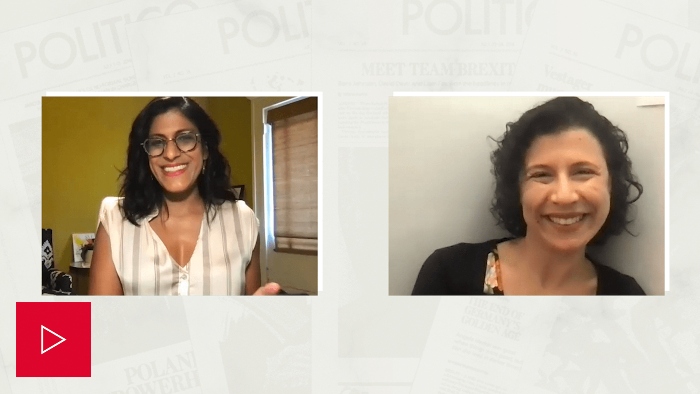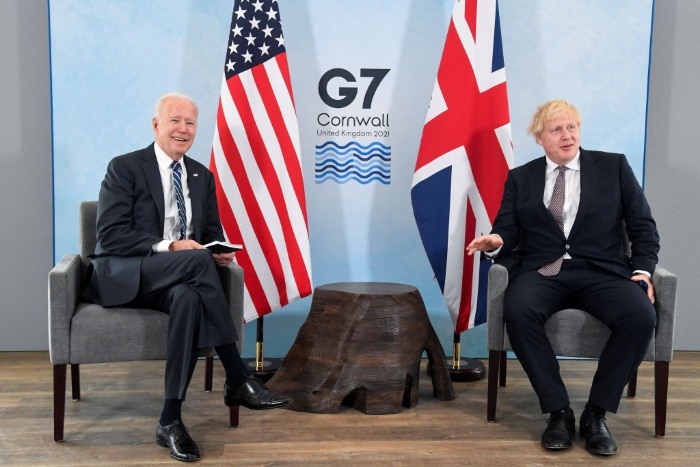| | |  | BY RENUKA RAYASAM | Presented by |  |
|
| With help from Joanne Kenen
| 
| THE OMAR AFTERMATH — House Speaker Nancy Pelosi’s leadership team put out a statement this afternoon that rebuked Rep. Ilhan Omar (D-Minn.), one of the first two Muslim women elected to Congress, for comparing war crimes committed by the U.S. and Israel to those of the Taliban and Hamas — while also thanking her for clarifying those comments. The statement came after about a dozen House Democrats said Omar was “drawing false equivalencies” in the comments she made earlier this week. The House GOP is rushing to use the episode to try to pry open a growing rift on Middle East policy within the Democratic Party, whose younger progressives are more likely to be sympathetic to Palestinian causes than the party’s leaders are. “I think we’re going to see further stress in the upper ranks of the Democratic Party as they figure out how much of this newly emboldened progressive message on the Israel-Palestine conflict they can actually integrate into their topline message,” Congress editor Elana Schor told Nightly today from a Senate phone booth. Omar is not being accused of antisemitism this week, although that charge has been directed at her before , Elana said. “This all started because there’s been an uptick in anti-Semitic attacks quite recently,” she said. After a recent meeting to discuss those attacks, Democratic lawmakers held a second meeting where they discussed Omar’s comments. About half of the lawmakers who attended that meeting ended up signing the statement that called on Omar to clarify her remarks. This episode is just a preview of a larger fight around Israeli-Palestinian politics inside the Democratic Party. “It puts them in an undeniable bind because you have Republicans ready to make this into a political cudgel at every turn,” Elana said. Watch to see if Renu and Elana can explain the new U.S. politics of the Middle East in 5 minutes. Welcome to POLITICO Nightly. No, Sen. Sanders, being a cannabis reporter at this publication does not require you to be stoned. Reach out with news, tips and ideas for us at rrayasam@politico.com, or on Twitter at @renurayasam.
| |
A message from AARP: Congress: It’s time to let Medicare negotiate for lower drug prices. The President, Congress, and the American people agree: we need to lower prescription drug prices. Americans can’t afford to pay the highest prices in the world for their prescription drugs. Giving Medicare the power to negotiate will save hundreds of billions of dollars and reduce prescription drug costs for all Americans. aarp.org/FairRxPrices | | | | | | |
Unlike many Jan. 6 defendants, Jeffrey Sabol left no digital footprint of his political evolution. Friends say he was never a big user of social media. But he spoke openly to investigators about his views while recovering at the Westchester Medical Center in Valhalla, N.Y., after his arrest, telling agents “There was no question” the 2020 presidential election was “stolen” from Trump. He had seen videos of ballots being mishandled, he said, and knew voting machines had been tampered with, even though more than 100 judges around the country have determined that no credible evidence of fraud exists.
He said he was a “patriot warrior” who had answered “the call to battle” and was “fighting tyranny in the D.C. capital.” Law enforcement have recovered at least one deleted text message of Sabol’s from Jan. 6, a video in which Sabol tells a friend he had just been pepper-sprayed outside the Capitol and that “we are going back in.” FROM "THE GEOPHYSICIST WHO STORMED THE CAPITOL" BY MELANIE WARNER, COMING FRIDAY TO POLITICO MAGAZINE |
| | |
| | DON'T MISS THE MILKEN INSTITUTE FUTURE OF HEALTH SUMMIT: POLITICO will feature a special edition of our Future Pulse newsletter at the 2021 Milken Institute Future of Health Summit. The newsletter takes readers inside one of the most influential gatherings of global health industry leaders and innovators who are turning lessons learned from the past year into a healthier, more resilient and more equitable future. Covid-19 threatened our health and well-being, while simultaneously leading to extraordinary coordination to improve pandemic preparedness, disease prevention, diversity in clinical trials, mental health resources, food access and more. SUBSCRIBE TODAY to receive exclusive coverage from June 22-23. | | | | | | | — Adams releases E-ZPass records to prove his New York bona fides: Eric Adams released E-ZPass records for several government vehicles today as part of an evolving inquiry into how much time the mayoral candidate and Brooklyn borough president spends at the Garden State co-op he owns with his partner. The readout of toll payments indicates Adams took city cars over the George Washington Bridge or through the Lincoln Tunnel on six separate weekends in July, August, September and October of last year, as well as once in February this year. POLITICO separately found Wednesday that Adams dialed into campaign and borough president functions from the Garden State on five other occasions — including two weekday trips — that were not reflected in the year’s worth of toll records that began in mid-May 2020. Campaign manager Evan Thies said that Adams traveled by bus on those occasions. — Defense secretary ‘concerned’ about Iranian ships transferring arms to Venezuela: Defense Secretary Lloyd Austin told lawmakers today that he shared their concerns about Iranian Navy ships currently heading across the Atlantic and possibly transferring weapons to Venezuela, marking the first time the Pentagon chief has spoken publicly about the ships’ movement. — GOP Rep. Byron Donalds calls CBC silence on membership delay “off-putting”: Republican Rep. Byron Donalds expressed frustration today at being prevented from entering the Congressional Black Caucus without a clear indication why. In an interview on CNN, Donalds (R-Fla.) said his office has “not really heard much from the CBC” in the months since he expressed interest in joining the group and that no one has communicated why he is being kept out. — Cuellar urges Biden, Harris to visit southern border: Rep. Henry Cuellar today urged Biden and Vice President Kamala Harris to visit the U.S. southern border, ramping up pressure on the White House as Harris continues to face bipartisan criticism for remarks made in Guatemala on her first foreign trip. Cuellar (D-Texas) — a centrist within his party who is outspoken on issues related to immigration and the U.S.-Mexico border — told MSNBC that Biden and Harris should “come in and, with all due respect, not do a staged visit.”
| |
| |  
| | | | | INFRASTRUCTURE BLEAK? Senators painted a confusing picture on the status of infrastructure talks as they left D.C. for the weekend, with some claiming major progress and others skeptical a deal is in hand, Burgess Everett and Marianne LeVine write. Late this afternoon, the group released a statement trying to clear up the confusion. But it omitted the total cost of the deal and came only after significant internal discord among the members over how much information to reveal, sources close to the issue said. “Our group — comprised of 10 Senators, 5 from each party – has worked in good faith and reached a bipartisan agreement on a realistic, compromise framework to modernize our nation’s infrastructure and energy technologies,” the group led by Sens. Kyrsten Sinema (D-Ariz.) and Rob Portman (R-Ohio) said in a statement. “This investment would be fully paid for and not include tax increases.”
| | Nightly asks you: Are you a vaccinated person who has a family member or friend who refuses to get vaccinated? Tell us your story using our form. We’ll include select answers in a future edition.
| |
| | SUBSCRIBE TO "THE RECAST" TODAY: Power is shifting in Washington and in communities across the country. More people are demanding a seat at the table, insisting that politics is personal and not all policy is equitable. The Recast is a twice-weekly newsletter that explores the changing power dynamics in Washington and breaks down how race and identity are recasting politics and policy in America. Get fresh insights, scoops and dispatches on this crucial intersection from across the country and hear critical new voices that challenge business as usual. Don't miss out, SUBSCRIBE . Thank you to our sponsor, Intel. | | | | | | | | 
Britain's Prime Minister Boris Johnson meets with U.S. President Joe Biden, ahead of the G-7 summit, at Carbis Bay Hotel near St Ives, England. | Getty Images | STILL SPECIAL — Biden and British Prime Minister Boris Johnson promoted their efforts to strengthen the U.S.-U.K. alliance in a joint statement released today after their bilateral meeting — Biden’s first overseas summit with a foreign leader since assuming office. According to the statement, the 90-minute session focused on democracy, human rights and multilateralism; defense and security; science and technology; trade and prosperity; climate and nature; health; and the shared commitment to Northern Ireland. Biden and Johnson laid out their “global vision” in an updated version of the Atlantic Charter of 1941, the agreement authorized by Franklin D. Roosevelt and Winston Churchill that established a set of post-war objectives for the two countries’ relationship. “Our revitalised Atlantic Charter, building on the commitments and aspirations set out 80 years ago, affirms our ongoing commitment to sustaining our enduring values and defending them against new and old challenges,” Biden and Johnson said in the new charter’s text. “We commit to working closely with all partners who share our democratic values and to countering the efforts of those who seek to undermine our alliances and institutions,” they added. Plus: Hot Vax Summer, but for who? Covid is receding in the U.S. But globally the pandemic is on track to be worse this year than in 2020 — and world health leaders are calling on wealthy nations to step up their game. In the latest POLITICO Dispatch, global health reporter Carmen Paun looks at whether anything could come out of this week’s G-7 summit.
| | | | | |
10.3 million The number of workers in health care settings the new Labor Department coronavirus safety rules will apply to, according to DOL estimates . Health care employers will be required to provide masks, physical barriers, social distancing and proper ventilation to ensure their employees are protected from Covid-19 under emergency workplace rules released today. |
| | | SHAME SPIRAL — Health care editor at large Joanne Kenen emails Nightly: Over the weekend, I wrote for POLITICO Magazine about my difficulty in switching coronavirus vaccines after a bad reaction to my first shot. I’ve since heard a lot from other non-cookie cutter patients all over the country, some with symptoms like my own (or much worse), who are still struggling to figure out what’s safe for them, and how to get a second dose. But one thing I didn’t get into in that article was Covid shame. As part of my medical workup, I had to take a special antibody test to find out if I had ever had an undiagnosed mild case of Covid. If so, the natural antibodies combined with the antibodies produced by one mRNA shot would have given me pretty strong immunity. It would have been a sweet solution. I would have been done with that one shot, at least until the whole booster thing gets straightened out. Yet the prospect of having had Covid made me irrationally upset. I felt that somehow I, a health journalist who knew more about this pandemic than the average bear, had failed. I knew that was silly — but I felt anticipatory stigma anyway. Some people who flouted public health advice got sick — but they were being fed dangerous misinformation by people they trusted. Some people who took every precaution still got sick — sometimes bad luck, often because they or their family members were doing essential work that enabled so many of us to stay safe at home. The antibody test was negative and I felt disproportionate relief. That bronchitis I had was really just bronchitis, the lingering cough just seasonal allergies. No lurking symptoms to rise up and bite me. The months hunkered down weren’t an exercise in futility. They had protected me and members of my family (one of whom had some Covid risk factors.) And all that stuff we had picked up or had delivered, and all the pandemic-generous tips we had given — well, we’ve already cut back on the deliveries. Way fewer cardboard boxes to recycle. But no regrets about the generous tips in this year of loss and deprivation. It’s the one Covid practice I’m taking with me to the post-Covid world.
| |
A message from AARP: Congress: Act now to lower prescription drug prices. Every year, Medicare spends more than $129 billion on prescription drugs. Yet, it's prohibited by law from using its buying power to negotiate with drug companies for lower prices. This must change. Americans are sick and tired of paying three times what people in other countries pay for the same medicine, forcing many to choose between buying the prescription drugs they need and paying for food and rent. aarp.org/FairRxPrices | | | Did someone forward this email to you? Sign up here. | |
|
| | Follow us on Twitter | | | FOLLOW US
|
| |

No comments:
Post a Comment
Note: Only a member of this blog may post a comment.